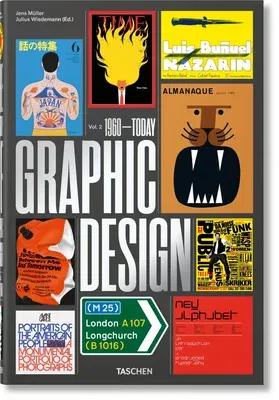Through the turbulent passage of time, graphic design--with its vivid,
neat synthesis of image and idea--has distilled the spirit of each age.
Surrounding us every minute of every day, from minimalist packaging to
colorful adverts, smart environmental graphics to sleek interfaces:
graphic design is as much about transmitting information as it is about
reflecting society's cultural aspirations and values.
This second volume rounds off our in-depth exploration of graphic
design, spanning from the 1960s until today. About 3,500 seminal designs
from across the globe guide us in this visual map through contemporary
history, from the establishment of the International Style to the rise
of the groundbreaking digital age. Around 80 key pieces go under the
microscope in detailed analyses besides 118 biographies of the era's
most important designers, including Massimo Vignelli (New York subway
wayfinding system), Otl Aicher (Lufthansa identity), Paula Scher
(Citibank brand identity), Neville Brody (The Face magazine), Kashiwa
Sato (Uniqlo brand identity), and Stefan Sagmeister (handwriting
posters).
With his sweeping knowledge of the field, author Jens Müller curates the
standout designs for each year alongside a running sequence of design
milestones. Organized chronologically, each decade is prefaced by a
succinct overview as well as a stunning visual timeline, offering a
vivid display of the variety of graphic production in each decade as
well as the global landscape which it at once described and defined.
This collection of important graphic works represents a long-overdue
reflection on the development of a creative field constantly changing
and challenging itself. These key pieces act as coordinates through
contemporary history, helping us trace the sheer influence of graphic
design on our daily lives.
Combined with Volume One--which spans from the field's very beginnings
until 1959--the tomes offer the most comprehensive exploration of
graphic design to date.

